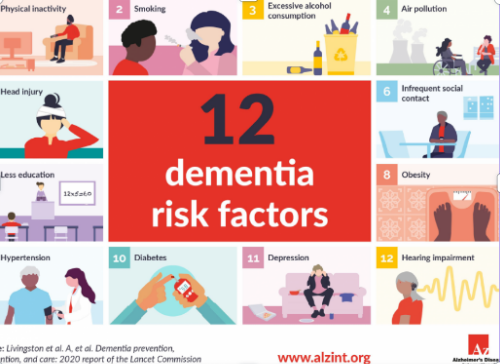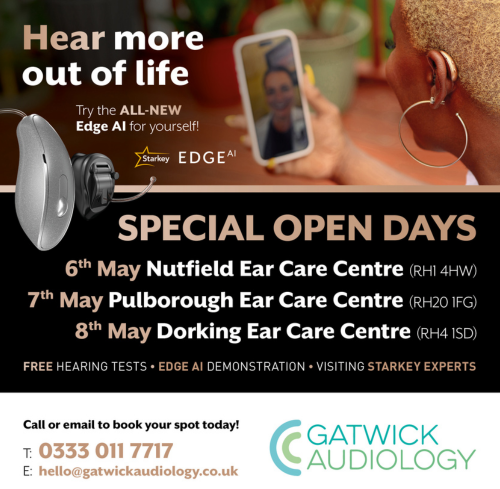
Hearing aid solutions to suit your lifestyle
September 22, 2022
We know there is a lot more in the world to hear, and we don’t want to miss it!
November 9, 2022Article courtesy of Phonak – https://audiologyblog.phonakpro.com/
Over 55 million people are living with dementia and the number grows every year.1
It is estimated to impact at least 250 million people globally. The cost to society is over 1.3 trillion dollars and rises rapidly every year as well.1 Once minimised and misunderstood as ‘forgetfulness in the elderly’2, dementia is not an inevitable part of aging.

What modifiable risk factors are linked to dementia?
Many factors have been linked to the development of dementia. Some are risk factors, while others appear to be protective. The greatest risk factor for Alzheimer’s disease and other dementias is increasing age. Although we cannot change our genes or stop aging, there are changes that we can make to reduce our risk of dementia, either lifestyle changes as individuals or wider changes across society.3
A growing body of research evidence exists for 12 potentially modifiable risk factors.3 We might prevent or delay up to 40% of cases of dementia if we were able to modify all of the risk factors.

Although behaviour change is difficult and some associations might not be causal, individuals have a huge potential to reduce their dementia risk.
Is treating hearing loss important for brain health?
Hearing loss is increasingly recognised as a risk factor for brain health – especially later in life. It has been identified as the single largest potentially modifiable risk factor for dementia by the Lancet commission.3 It is estimated that 8% of the modifiable risk of incident dementia in the population can be attributed to hearing loss.
However, research evidence is still building, population-based, and not always conclusive. It requires long follow-ups and is not speaking to the risk of an individual. Also, the mechanisms for the association between hearing loss and cognitive decline are currently not understood.
Today there is insufficient evidence to recommend the use of hearing aids to reduce the risk of dementia.4 However, there are all good reasons to recommend hearing aids in case of a hearing loss for enabling speech comprehension, and for engaging in communication, activities, and participation in life.
The World Health Organization (WHO) strongly advocates in the 2021 World Report on Hearing that hearing screening followed by the provision of hearing aids should be offered to older people for timely identification and management of hearing loss.5
| Dementia is an umbrella term for a collection of different progressive degenerative brain syndromes which affect memory, thinking, behavior and emotion. Alzheimer’s disease is the most common type of dementia and accounts for up to 60% of all cases.1 Symptoms may include:1 • loss of memory • difficulty in finding the right words or understanding what people are saying • difficulty in performing previously routine tasks • personality and mood changes Dementia is sometimes difficult to differentiate from hearing loss since difficulty communicating is a hallmark of both. Although each person will experience dementia in their own way, eventually those affected are unable to care for themselves and need help with all aspects of daily life. |
There is currently no cure for dementia. Still, there are medications and treatments which can help with some of the symptoms and exacerbating factors. The focus is, however, on the importance of care, information, advice, and support to enable independence, and facilitate living at home and in the community for as long as possible. 1
That is why it is important for us in the hearing industry to be informed – as the campaign message for World Alzheimer’s Month says, “Together, we can do so much”.
#KnowDementia #KnowAlzheimers
As for whether hearing aid use can delay or mitigate the risk for dementia, this is a hot topic for us in the research community. Sonova is currently supporting several ongoing studies related to this topic. We look forward to sharing the results when they become available next year. Stay tuned!
References:
- Alzheimer’s Disease International (2022, Sep 09). About Alzheimer’s & Dementia. https://www.alzint.org/about/
- Shenk, D. (2003). The Forgetting. Alzheimer’s: Portrait of an Epidemic. Random House Inc., New York.
- Livingston, G., Huntley, J., Sommerlad, A., Ames, D., Ballard, C., Banerjee, S., … Mukadam, N. (2020). Dementia prevention, intervention, and care: 2020 report of the Lancet Commission. The Lancet, 396:413-46. doi:10.1016/S0140- 6736(20)30367-6
- World Health Organization (2019). Risk reduction of cognitive decline and dementia: WHO guidelines. Geneva: WHO. License: CC BY-NC-SA 3.0 IGO. https://www.who.int/publications/i/item/9789241550543
- World Health Organization (2021). World report on the hearing. Geneva: WHO. License: CC BY-NC-SA 3.0 IGO. https://www.who.int/publications/i/item/world-report-on-hearing




